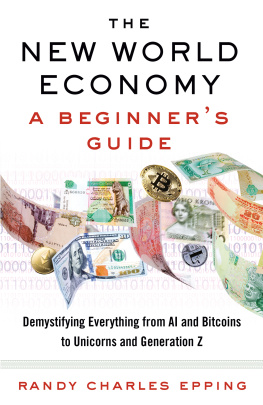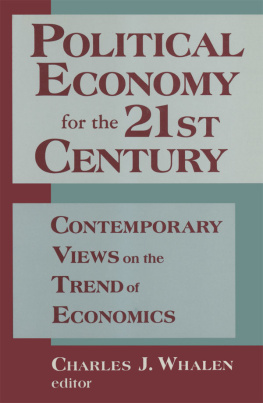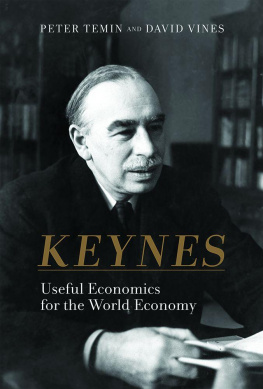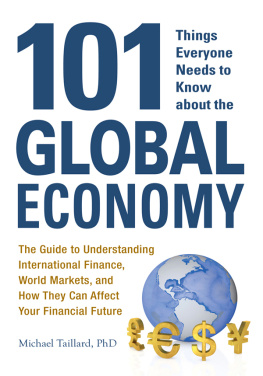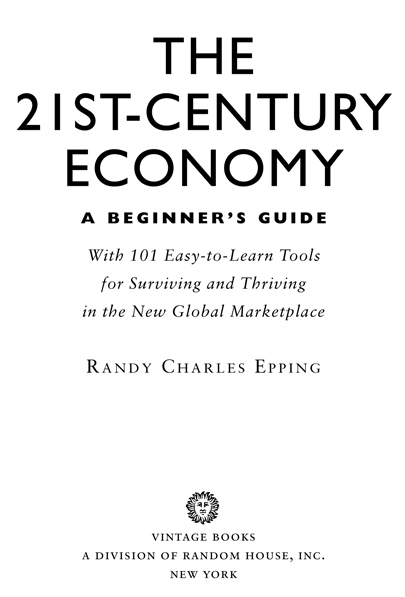RANDY CHARLES EPPING
THE 21ST-CENTURY ECONOMY
A Beginner's Guide
Randy Charles Epping, based in Nyon, Switzerland, and So Paulo, Brazil, has worked in International Finance for over twenty-five years, holding management positions in European and American investment banks in London, Geneva, and Zurich. He has a master's degree in International Relations from Yale University, in addition to degrees from the University of Notre Dame and the University of ParisSorbonne. He is currently the manager of IFS Project Management AG, a Switzerland-based international consulting company. He is also the president of the Central Europe Foundation, a Zurich-based charity providing assistance to students and economic organizations in Central and Eastern Europe. In addition to several other books and articles on the world economy, he has written a novel, Trust, a financial thriller based in Budapest, Zurich, New York, and So Paulo.
ALSO BY RANDY CHARLES EPPING
The Beginner's Guide to the World Economy
Novels
Trust
To Thalia Zepatos, thank you for your inspiration. To Richard Lupoff and Frank Robinson, thank you for your example. To Jnos Farag, thank you for your ideas. And to Jerrod, Shawn, and Chas Engelberg, thank you for your corrections.
In Memoriam: Tracy Lawrence Epping
I would also like to thank my agent, Kirsten Manges, and my editors at Vintage Books, Edward Kastenmeier, Tim O'Connell, and Marty Asher, for their vision and ongoing efforts to create an economically literate world. As the Economist once said, Politicians care about what voters think, especially voters in blocks, and not a shred about what economists think. Talking to politicians about economics is therefore a waste of time. The only way to make governments behave as if they were economically literate is to confront them with electorates that are.
TABLE OF CONTENTS
| 1. |
| 2. |
| 3. |
| 4. |
| 5. |
| 6. |
| 7. |
| 8. |
| 9. |
| 10. |
| 11. |
| 12. |
| 13. |
| 14. |
| 15. |
| 16. |
| 17. |
| 18. |
INTRODUCTION
U NDERSTANDING THE WORLD economy has never been more important than it is today. What happens in one corner of the globe can affect us and our families in ways that would have been unimaginable in previous years.
In today's interconnected fusion economy, almost anything can happen. A downturn in one part of the world can turn into a global financial meltdown within daysif not hours. When a housing crisis in a few American states grew into a full-fledged financial crisis in 2008, for example, it sparked one of the biggest stock-market meltdowns in modern history. And when countries, companies, and banks around the world began tumbling like dominoes, the so-called credit crisis became an economic inferno. Money dried up and companies were forced to lay off employees and cut back production. Even the developing world was impacted, when investors from rich countries pulled funds from the four corners of the globe to cover losses at home.
It was just a matter of time before the economic crisis became a political and social crisis as well. When people lose their jobs or their retirement savingsor worse, when food runs out, as it already has in some countries around the worldit doesn't take much to bring down governments or engender social chaos.
Never before has it been so important for us to become economically literate. The idea of this book is not only to give you a thorough understanding of what's happening in the world economy today, but to provide you with the tools to be able to make sense of future economic eventsgood or bad. These days, the front pages of our newspapers are flooded with business-and economics-related articles. Web sites are increasingly devoted to economic issues. And the news we see and hear on TV and radio is increasingly economic in content.
Even the water-cooler conversations have become economic in nature. How's your 401(k) surviving the crash? Will Congress be able to get us out of the mess we're in? What about those foreign investors, are they going to pull out their investments and bring down the economic house of cards? How are we going to be able to pay for our children's education, our retirement, our fuel this winter? Will there be enough money around to ensure our economic survival in the years to come?
Faced with the enormous complexity of the new global economy, many of us tend to shrug our shoulders and say, It's all too difficult. Let the economists figure it all out. But if we're going to survive and thrive in this strange new world, we're going to have to understand the basics. Unfortunately, most economists today are not able to explain things simply.
I remember how my first economics professor at Yale, a brilliant man by all accounts, thought that any question needed to be answered with a complicated graph or a formula. No question could be answered with a simple yes or no. Always with a Let me draw you an equation, or Let's look at this graph. I would sit there and stare at the complex array of numbers and Greek letters he was writing on the blackboard and wonder, Is this really the only way to understand economics?
I had the impression that if someone had asked the question What's the weather like today? the brilliant economist would begin his answer by writing out a complex formula or matrix equation. Sometimes, all you have to do is look out the window. The answers are often right there, staring at us in the face.
What is a stock index? Think of checking the cost of a few items in a store to see how the market as a whole is priced. Or what is a leveraged buyout? Think of a seesaw, lifting a heavy weight at one end with a small amount of force at the other. The same concept allows investors who borrow money to finance their acquisitions to get more bang for their buck.
We are all citizens of this increasingly interconnected world, and we're going to have to understand the economic forces shaping our daily lives if we're going to profit from them or intelligently oppose them. Student, farmer, businessperson, criminal, lawyer, politician, homemaker, or environmental activistwhoever we are, we all have a role to play. And without a basic understanding of the world economy and its effect on our daily lives, we're never going to be effective members of society.
The intent of this book is to provide an easy-to-understand survey of the 21st-century economy, so that whoever we areconsumers, voters, businesspeople, or studentswe'll be able to survive, and thrive, in the new global marketplace. All we need is a basic understanding of how this new 21st-century economy works.
Although this isn't meant to be a get-rich-quick book, it's obvious that any successful foray into the global marketplace needs to be accompanied by a thorough understanding of the principles on which global finance and economics are based. Imagine trying to invest in an Internet-based IPO without knowing your way around the Web-based economy. Or trying to convince your government to increase spending on biofuels without knowing the underlying fundamentals of the green economy and the effect these policies will have on global food production. Or how to bail out failed banks without bankrupting the government in the process.


